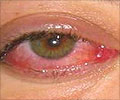Millions of tiny microbes, hitherto unknown to science have been discovered at the bottom of the sea.
These organisms include microbes of bacteria, worms and ocean insects less than 1mm long.Scientists made the path-breaking discovery using technology such as DNA sequencing, that allows researchers to differentiate between different species, and submarines that can be operated thousands of feet under the sea.
A survey was conducted as part of a 10-year international project to find out more about the oceans, the Census of Marine Life.
For one study, ocean samples were gathered from over 1,200 sites around the world to find out more about microbial life.
It discovered microbes with 18 million different DNA sequences, suggesting the presence of millions of yet unknown species.
Another project found 7,000 new genus of bacteria in the Western English Channel alone.
Advertisement
The findings of the survey have led scientists to believe that there could be a billion microbial cells in every litre of seawater.
Advertisement
A study into roundworms found 500,0000 in a single square metre of ocean floor, while currently there are 16,000 known species of seaworms.
John Baross of the University of Washington, a contributor to the census, said the findings would open up new doors in science that could help understand changes in the food chain, weather patterns and carbon cycles.
"Marine animals alone may account for hundreds of millions microbial species. This is a huge frontier for next decade," the Telegraph quoted him as saying.
Source-ANI
RAS









